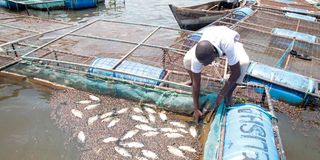Concerns over fresh wave of fish deaths in Lake Victoria’s cages

A fisherman collects dead fish from fish cages in Lake Victoria on October 20, 2022. Fish kills has affected a total of 135 cage farmers in 10 beaches along the lake.
Barely six months after massive deaths of fish in Lake Victoria, tens of cage owners have suffered yet another loss, which researchers have linked to suffocation.
The young fingerlings are reported to have started dying on Monday, with the highest number of deaths reported on Wednesday morning. According to a report by the Kenya Marine and Fisheries Research Institute (KMFRI), the fingerlings died after being deprived of oxygen. Dr Christopher Aura of KMFRI cited increased concentration of algae, which is decomposing and utilising oxygen in the water, causing low levels of dissolved oxygen.
“Thick layer of algal blooming at the site was a sign of increased water pollution whose decomposition may have lowered dissolved oxygen levels; the nets surrounding the cages had also been clogged, limiting water circulation,” he said.
Shallow waters
Dr Aura also said the cages had been placed in shallow waters below the recommended standards of cage aquaculture of six metres. But the farmers have disputed the report, arguing that the fish could have died from continuous lake pollution.
According to residents, the lake had been emitting a choking smell in the past few weeks, while the water remained decolourised, an indication of continuous pollution.
“We want to know the cause of the deaths. Last year, we were told the animals had suffocated, but the big question is: Why would the fish suffocate in their natural habitat?” asked Mr Joel Okumu. “We want to know the root cause of the problem and why it is happening now, why we have the algae in the lake and the source of the choking smell.”
The deaths occurred just two days after Governor Peter Anyang’ Nyong’o distributed fingerlings to more than 94 farmers who had been affected by the killings in September last year on Ogal beach.
As per the data released on Wednesday evening, the fishermen claimed that 60 cages stocked with thousands of fingerlings in January had been affected. “The first case was reported on Monday morning when some of the cage fish farmers visited the lake but found hundreds of dead fish while some were still gasping for breath,” said Mr Michael Otieno, one of the farmers.
Mr Otieno told the Saturday Nation that they had assumed the deaths had been caused by wild lake waves when the first incident was reported on Monday. The fishermen, however, got worried when a similar incident was reported on Tuesday and Wednesday.
August harvest
By Wednesday, all the fish remaining in the cages had succumbed mysteriously. The cage owners said they were preparing to harvest in August.
“Most of the dead fish floating in the cages had turned white and had swollen bellies. The rest were gasping for oxygen with wide open mouths,” he said.
The fish farmer, who had 10 cages, said he had invested almost half a million shillings to kick-start production.
Also affected was Partson Okumu, who said he lost fish in five cages. He said a number of fishermen had initially complained about the smelling lake days before the incident.
He said other small fish, including shrimps and water bugs, had also been affected.
In September last year, a similar incident was reported in Kisumu and Homa Bay counties, leading to a Sh1 billion loss.
Movement restriction
The incident had also been linked to suffocation—limited water and air circulation—with the cages hindering the fish from swimming out of danger.
Meanwhile, during an interview, a fisheries expert, who sought anonymity due to the sensitivity of the matter, said the massive deaths are likely to recur because of continuous pollution in the lake.
According to the expert, the choking smell from the lake and the massive deaths are likely to occur whenever temperatures rise.
“During the rainy season, the temperatures are low and bacteria are lazy, so you might not get the smell. When the temperatures rise, the organic matter starts decomposing, which, in turn, emits the foul smell,” he said, adding that while decomposing, the bacteria competes with fish for oxygen, leading to suffocation.
He said the only remedy is protecting the lake from continuous pollution either from firms or human activities.






